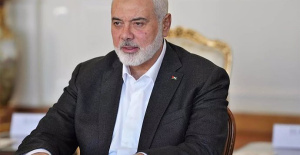BRUSELAS, 28 Nov. (EUROPA PRESS) -
The European Parliament's commission of inquiry into espionage with the Pegasus software will analyze the situation in Spain this Tuesday in a monographic session, an appointment in which the director of the National Intelligence Center, Esperanza Casteleiro, will intervene by videoconference.
Approved last March, the European Parliament's investigation commission tries to shed light on the alleged use of this espionage tool by European governments and was created with a special focus on the situation in Hungary and Poland, although the cases that arose in Spain and Greece have turned attention to these countries.
In the Spanish case, both the revelation of the alleged espionage of 65 pro-independence leaders uncovered by the 'Citizen Lab' center and the attack on the mobile device of the President of the Government, Pedro Sánchez, and the Interior Ministers, Fernando Grande-Marlaska, are being studied. and Defense, Margarita Robles.
This situation will be reflected in the session on Tuesday in which the journalist Ignacio Cembrero will participate, whose device was allegedly attacked by the Moroccan authorities, the lawyer Andreu Van den Eynde, alleged victim of espionage and lawyer of the ERC leader, Oriol Junqueras. , and Professor Gregorio Martín, an expert in cybersecurity.
Subsequently, the director of the CNI and the Secretary General of Digital Administration, Juan Jesús Torres Carbonell, will take the floor by videoconference, who will give their arguments on the use of espionage software and will submit to questions from the MEPs. Casteleiro precisely went on to direct the Intelligence services last May after the dismissal of Paz Esteban as a result of the espionage scandal with the 'Pegasus' program.
The session will also be the first opportunity in which MEPs will debate the controversial draft report presented by the speaker, the Dutch liberal Sophie Int 'Veld, in which she confirmed the espionage of 65 Catalan separatists uncovered by 'Citizen Lab' , although without providing more information than the center's own investigation and press clippings, many of them from media outlets related to the independence movement.
The report generated criticism from PP, PSOE and Ciudadanos who considered that it did not provide factual evidence and was limited to making a compilation of conjectures about the use of Pegasus in Spain. At a press conference, Int 'Veld denounced the lack of cooperation of the Spanish authorities with the investigation commission and acknowledged that the report does not contain official information,
On behalf of the independence movement, the ERC MEP and vice-president of the investigation commission, Diana Riba, will offer a press conference at the end of the session, while Toni Comín, Junts, Ernest Maragall, ERC, and Carles Riera, CUP, will travel to Brussels for an act denouncing the alleged espionage against separatist leaders. Elisenda Paluzie, from ANC, and Elena Jiménez, from Omnium, will also participate in this event.
The session is preceded by controversy over the list of participants, since the technical list initially agreed between the Spanish representatives of the different groups, PSOE, PP and Ciudadanos, was changed at the level of group coordinators, with the approval of socialists, greens and Liberals, to include Andreu Van den Eynde at the last minute and exclude the researcher José Javier Olivas, critical of the 'Citizen Lab' report.
The step was taken after the Citizen Lab environment circulated a letter among MEPs discrediting the work of this Spanish expert. In said letter, to which Europa Press has had access, Olivas' lack of technical knowledge about espionage was pointed out and he is accused of having promoted conspiracy theories and falsehoods about other researchers. He also accuses him of participating in the harassment of espionage victims and experts who have investigated the cases.
In statements to Europa Press, Olivas regretted that the European Parliament gave in to pressure from Citizen Lab and pointed out that the letter was a compendium of "crude accusations." In the opinion of the Spanish professor, the report on the alleged espionage through the Pegasus program on 65 pro-independence leaders has important "ethical and methodological flaws" and does not provide "solid bases to draw a conclusion about what happened."

 Exploring Cardano: Inner Workings and Advantages of this Cryptocurrency
Exploring Cardano: Inner Workings and Advantages of this Cryptocurrency Seville.- Economy.- Innova.- STSA inaugurates its new painting and sealing hangar in San Pablo, for 18 million
Seville.- Economy.- Innova.- STSA inaugurates its new painting and sealing hangar in San Pablo, for 18 million Innova.- More than 300 volunteers join the Andalucía Compromiso Digital network in one month to facilitate access to ICT
Innova.- More than 300 volunteers join the Andalucía Compromiso Digital network in one month to facilitate access to ICT Innova.-AMP.- Ayesa acquires 51% of Sadiel, which will create new technological engineering products and expand markets
Innova.-AMP.- Ayesa acquires 51% of Sadiel, which will create new technological engineering products and expand markets Hamas views Israel's latest deal proposal in "positive spirit"
Hamas views Israel's latest deal proposal in "positive spirit" The Ibex 35 rises 0.22% mid-session driven by Aena (4.66) and Sabadell (4.57%)
The Ibex 35 rises 0.22% mid-session driven by Aena (4.66) and Sabadell (4.57%) STATEMENT: Selena Romero and Roberto Pérez winners of the 22nd Nacho Juncosa Memorial - International under-16 tennis tournament
STATEMENT: Selena Romero and Roberto Pérez winners of the 22nd Nacho Juncosa Memorial - International under-16 tennis tournament STATEMENT: DH2 Energy is the winner in the first European renewable hydrogen auction
STATEMENT: DH2 Energy is the winner in the first European renewable hydrogen auction How Blockchain in being used to shape the future
How Blockchain in being used to shape the future Not just BTC and ETH: Here Are Some More Interesting Coins Worth Focusing on
Not just BTC and ETH: Here Are Some More Interesting Coins Worth Focusing on UPV students design an app that helps improve the ventilation of homes in the face of high temperatures
UPV students design an app that helps improve the ventilation of homes in the face of high temperatures Ivace and promotes a less invasive device for the early detection of prostate cancer
Ivace and promotes a less invasive device for the early detection of prostate cancer Valencia unanimously approves the ordinance to allocate spaces to test innovative initiatives
Valencia unanimously approves the ordinance to allocate spaces to test innovative initiatives UPV researchers promote a paid master's degree as a "talent factory" in integrated photonics
UPV researchers promote a paid master's degree as a "talent factory" in integrated photonics A million people demonstrate in France against Macron's pension reform
A million people demonstrate in France against Macron's pension reform Russia launches several missiles against "critical infrastructure" in the city of Zaporizhia
Russia launches several missiles against "critical infrastructure" in the city of Zaporizhia A "procession" remembers the dead of the Calabria shipwreck as bodies continue to wash up on the shore
A "procession" remembers the dead of the Calabria shipwreck as bodies continue to wash up on the shore Prison sentences handed down for three prominent Hong Kong pro-democracy activists
Prison sentences handed down for three prominent Hong Kong pro-democracy activists ETH continues to leave trading platforms, Ethereum balance on exchanges lowest in 3 years
ETH continues to leave trading platforms, Ethereum balance on exchanges lowest in 3 years Investors invest $450 million in Consensys, Ethereum incubator now valued at $7 billion
Investors invest $450 million in Consensys, Ethereum incubator now valued at $7 billion Alchemy Integrates Ethereum L2 Product Starknet to Enhance Web3 Scalability at a Price 100x Lower Than L1 Fees
Alchemy Integrates Ethereum L2 Product Starknet to Enhance Web3 Scalability at a Price 100x Lower Than L1 Fees Mining Report: Bitcoin's Electricity Consumption Declines by 25% in Q1 2022
Mining Report: Bitcoin's Electricity Consumption Declines by 25% in Q1 2022 Oil-to-Bitcoin Mining Firm Crusoe Energy Systems Raised $505 Million
Oil-to-Bitcoin Mining Firm Crusoe Energy Systems Raised $505 Million Microbt reveals the latest Bitcoin mining rigs -- Machines produce up to 126 TH/s with custom 5nm chip design
Microbt reveals the latest Bitcoin mining rigs -- Machines produce up to 126 TH/s with custom 5nm chip design Bitcoin's Mining Difficulty Hits a Lifetime High, With More Than 90% of BTC Supply Issued
Bitcoin's Mining Difficulty Hits a Lifetime High, With More Than 90% of BTC Supply Issued The Biggest Movers are Near, EOS, and RUNE during Friday's Selloff
The Biggest Movers are Near, EOS, and RUNE during Friday's Selloff Global Markets Spooked by a Hawkish Fed and Covid, Stocks and Crypto Gain After Musk Buys Twitter
Global Markets Spooked by a Hawkish Fed and Covid, Stocks and Crypto Gain After Musk Buys Twitter Bitso to offset carbon emissions from the Trading Platform's ERC20, ETH, and BTC Transactions
Bitso to offset carbon emissions from the Trading Platform's ERC20, ETH, and BTC Transactions Draftkings Announces 2022 College Hoops NFT Selection for March Madness
Draftkings Announces 2022 College Hoops NFT Selection for March Madness























